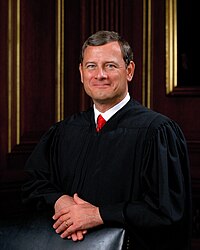
Photo from wikipedia
Recent years have seen growing interest in the judicialization of religious freedom (JRF). In this article, I identify two distinct meanings of JRF, which are often conflated but which need… Click to show full abstract
Recent years have seen growing interest in the judicialization of religious freedom (JRF). In this article, I identify two distinct meanings of JRF, which are often conflated but which need to be kept separate. I then argue for a stronger institutionalist approach to JRF. An institutionalist approach focuses our attention on both the rules internal to courts, and the relationship of courts to administrative agencies, legislatures, and other governing bodies. I argue that there is room to strengthen our analyses of JRF by paying greater attention to these institutional dynamics. I demonstrate this by highlighting two overlooked features of courts—interpretive rules and access rules—that are particularly important for governing JRF; and by developing a framework that relates the courts to other institutional venues and political actors. In so doing, I identify a number of promising directions for future research into the causes and consequences of JRF.
Journal Title: Journal for the Scientific Study of Religion
Year Published: 2018
Link to full text (if available)
Share on Social Media: Sign Up to like & get
recommendations!